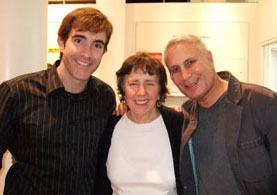REDCAT, the CalArts outpost in Walt Disney Concert Hall, opened its fifth season last night with the first of two programs in a renewal of the Creative Music Festival. Wadada Leo Smith was curator of the festival once again; he chose and assembled creators for two programs: “Music and the Voice” (last night) and “Music and Video” (tonight, but we already had tickets for Howard Shore’s “The Fly”). Smith opened the festival conducting the premiere of a new Smith work, “Central Park”, written for scat-singing baritone, with piano, string quartet, trumpet, clarinet, contra-alto clarinet, and percussion. Thomas Buckner was just right for the baritone instrumentalist; the whole ensemble seemed as if they had been playing together, with Smith’s music, for months instead of being a festival assembly of CalArts mainstays and New York performers.
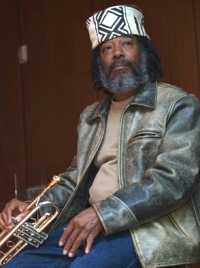 Wadada Leo Smith has a philosophy from which he composes. From our seats we could see both the piano score and the conducting score Smith used. This view made it clear how much improvisation went into the performance, and how much advance thought and consideration had preceded the improvising. A page of Smith’s conducting score, for example, had four rectangles and looked rather like a top-level conceptual diagram of a complex computer system. This page of the score covered three or four minutes of ensemble work and solos; during the period Smith might stop conducting and just listen before using his hands to regain the attention of the musicians before setting the beat and cuing the entrances for the next step in the evolution. Smith has developed a notation system called “Ankhrasmation”; he summarizes it here, but look at the symbolic example he provides on the page; the piano score had two or three pages with a symbol on the page.
Wadada Leo Smith has a philosophy from which he composes. From our seats we could see both the piano score and the conducting score Smith used. This view made it clear how much improvisation went into the performance, and how much advance thought and consideration had preceded the improvising. A page of Smith’s conducting score, for example, had four rectangles and looked rather like a top-level conceptual diagram of a complex computer system. This page of the score covered three or four minutes of ensemble work and solos; during the period Smith might stop conducting and just listen before using his hands to regain the attention of the musicians before setting the beat and cuing the entrances for the next step in the evolution. Smith has developed a notation system called “Ankhrasmation”; he summarizes it here, but look at the symbolic example he provides on the page; the piano score had two or three pages with a symbol on the page.
I liked Smith’s “Central Park”. I think Charles Ives would have liked it as well. The works are very different, but both present a kaleidoscope of sound. The two would make an interesting match on a program.
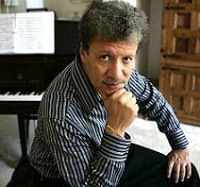 From that high point, the festival moved higher, with a set of works by Anthony Davis, currently one of the musical stars at UCSD. Davis had reassembled his group “Episteme”; the current version comprises J.D. Parran on clarinet and contr-alto clarinet, Earl Howard on alto sax and on synthesizer, his UCSD colleague Mark Dresser on bass, and Davis himself on piano. They opened with an emsemble work “Of Blues and Dreams”, which made me think of an evolution that Modern Jazz Quartet might have taken. For the theme of “Music and the Voice” they were joined by son Jonah Davis in “Malcolm Little’s Aria” from X: The Life and Times of Malcolm X and by wife Cynthia Aaronson-Davis who sang the art song “Lost Moon Sisters” to the poem “Ave” by Diane Di Prima. A variation on the “Voice” theme was taken by two other works. “Goddess Variations” was a set of elaborations from a theme in his opera “Amistad”, a real showpiece for the Tatum-like fingers of Davis as pianist. The concluding work was a showpiece for Parran on clarinet, the second movement (“Loss”) from Davis’ clarinet concerto titled You Have the Right to Remain Silent. I want to hear the whole thing!
From that high point, the festival moved higher, with a set of works by Anthony Davis, currently one of the musical stars at UCSD. Davis had reassembled his group “Episteme”; the current version comprises J.D. Parran on clarinet and contr-alto clarinet, Earl Howard on alto sax and on synthesizer, his UCSD colleague Mark Dresser on bass, and Davis himself on piano. They opened with an emsemble work “Of Blues and Dreams”, which made me think of an evolution that Modern Jazz Quartet might have taken. For the theme of “Music and the Voice” they were joined by son Jonah Davis in “Malcolm Little’s Aria” from X: The Life and Times of Malcolm X and by wife Cynthia Aaronson-Davis who sang the art song “Lost Moon Sisters” to the poem “Ave” by Diane Di Prima. A variation on the “Voice” theme was taken by two other works. “Goddess Variations” was a set of elaborations from a theme in his opera “Amistad”, a real showpiece for the Tatum-like fingers of Davis as pianist. The concluding work was a showpiece for Parran on clarinet, the second movement (“Loss”) from Davis’ clarinet concerto titled You Have the Right to Remain Silent. I want to hear the whole thing!
 The second half of the program stepped back to the merely pleasant with Amina Claudine Myers and her trio, joined by a choir of 14 from CalArts. In “Manhattan” the trio provided solid framework as the members of the choir gave a series of scat singing solo riffs; some of the improvisations were really good. Two other works gave the choir the solo opportunities associated with African-American church enthusiasms. To me the really good solos didn’t compensate for the length and repitiveness in an evening that ran over three hours. But it couldn’t spoil the accomplishments of the evening.
The second half of the program stepped back to the merely pleasant with Amina Claudine Myers and her trio, joined by a choir of 14 from CalArts. In “Manhattan” the trio provided solid framework as the members of the choir gave a series of scat singing solo riffs; some of the improvisations were really good. Two other works gave the choir the solo opportunities associated with African-American church enthusiasms. To me the really good solos didn’t compensate for the length and repitiveness in an evening that ran over three hours. But it couldn’t spoil the accomplishments of the evening.
I had been disappointed in what seemed to be the limited scope of last season’s music series at CalArts. But this season really looks great!
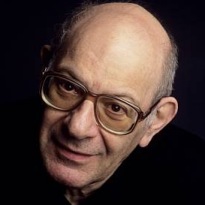

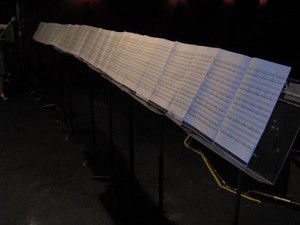 This is the score for “Piece in the Shape of a Square” spread out across the stage at the Players Theatre. Tonight in Manhattan at 8:00 PM we’re celebrating the 50th anniversary of the birth of Minimalism with a concert of Steve Reich’s “Piano Phase,” two “Piano Pieces” by the obscure but great Terry Jennings, Terry Riley’s “In C,” and this piece by Philip Glass.
This is the score for “Piece in the Shape of a Square” spread out across the stage at the Players Theatre. Tonight in Manhattan at 8:00 PM we’re celebrating the 50th anniversary of the birth of Minimalism with a concert of Steve Reich’s “Piano Phase,” two “Piano Pieces” by the obscure but great Terry Jennings, Terry Riley’s “In C,” and this piece by Philip Glass.